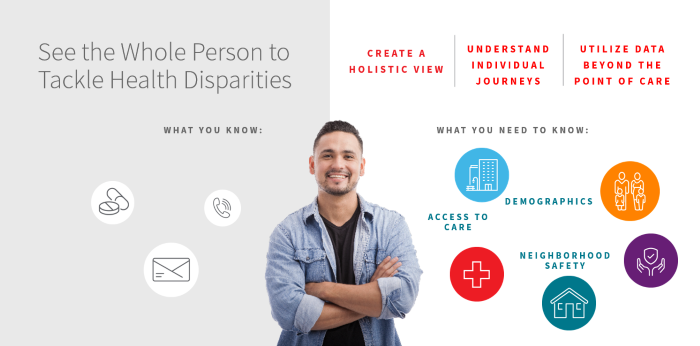LexisNexis® Social Drivers of Health Insights
Enabling a deeper understanding of how social drivers of health impact an individual's access to care, health outcomes and healthcare costs.
Improve Health Outcomes With Data-Driven Solutions
A growing focus on reducing healthcare disparities and addressing social drivers and barriers to quality care are critical. New policies, increased use of analytics and the need for diverse clinical research drive a heightened focus in healthcare.
Why Traditional Data Falls Short
Traditional self-reported and publicly available data often overlook the nuanced insights necessary to address the challenges faced by underserved groups. Organizations need meaningful, individualized, data-driven insights into their population and communities to achieve ambitious health equity goals without overwhelming staff or patients.

Healthcare organizations can better understand patients by accessing insights beyond clinical silos. With a complete picture of the patient population and data on social determinants of health (SDOH), organizations can proactively address disparities and work toward equitable healthcare.
The Strategic Advantage of SDOH Data in Your Hands
Inclusive Research
• Ensure diverse representation in clinical trials.
• Integrate health equity into all studies.
• Improve participant retention by addressing barriers to care.
Whole Person Care
• Enhance personalized care to boost adherence, reduce gaps in care and improve outcomes.
• Allocate resources to the highest-need patients with care management and support.
Health Economics & Outcomes Research
• Analyze cost-effectiveness to understand social factors affecting treatments and interventions.
• Align treatments and interventions with populations for optimal impact.
Population Health Management
• Design effective programs and quality initiatives by uncovering barriers to care.
• Inform strategic planning and resource allocation by evaluating social drivers of health
Additional Information:

Contact Us For More Information
Harness Insights on
Social Drivers of Health
for Better Decisions
and Outcomes
LexisNexis® Risk Solutions leverages individual-level data to provide organizations with insights on social drivers of health, improving predictive analytics accuracy and care coordination, and advancing clinical research.


Individual-level, multi-layer data attributes create a whole-person view, available identified or tokenized.

Patented machine learning technology matches data with greater than 99.9% precision.

Comprehensive data on nearly 100% of the U.S. adult population.

Attribute categories are aligned to industry standards and SDOH frameworks, like Healthy People 2030 and the Kaiser Family Foundation.

Highly flexible delivery options: integrate with population models and data, leverage raw attributes for analysis or specific modules aligned with focus areas.

Expert advisory services help guide your efforts to use the data effectively.

LexisNexis® Risk Solutions has been collecting and curating data for nearly five decades, with precise data available on nearly 100% of the U.S. adult population. Our proprietary technology and analytics transform data into meaningful insights, enabling organizations worldwide to overcome challenges and pursue their missions. We’re committed to data privacy and believe in using data for good to inspire positive change.
Together, we can advance health equity and create a healthier, more inclusive world for all.
Reporting Act (15 U.S.C. § 1681, et seq.) (“FCRA”) and does not constitute a “consumer report” as that term is defined in the FCRA. Accordingly, LexisNexis® Social Drivers of Health Insights may not be used in whole or in part as a factor in determining eligibility for credit, insurance, or employment or for any other eligibility purpose that would qualify it as a consumer report under the FCRA. Due to the nature and origin of public record information, the public records and commercially available data sources used in reports may contain
errors. Source data is sometimes reported or entered inaccurately, processed poorly or incorrectly, and is generally not free from defect. This product or service aggregates and reports data, as provided by the public records and commercially available data sources, and is not the source of the data, nor is it a comprehensive compilation of the data. Before relying on any data, it should be independently verified. LexisNexis® and the Knowledge Burst logo are registered trademarks of RELX Inc. Other products and services may be trademarks or registered trademarks of their respective companies. Copyright © 2025 LexisNexis Risk Solutions.
